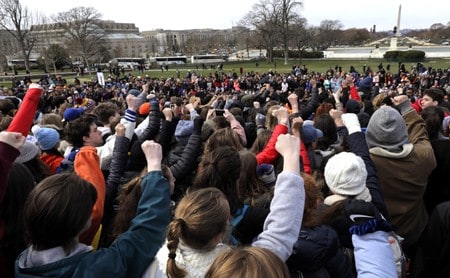By Ankur Banerjee
U.S. adolescents living in states with stricter gun laws may feel safer at school, a survey of high school students suggests.
Stronger gun laws were linked with lower odds that kids had been threatened or injured with any kind of weapon at school, had themselves carried a weapon, or had missed school because they felt unsafe, researchers found.
The data came from 926,639 teens in 45 states who participated in the Youth Risk Behavior Survey, a biennial survey of 9th through 12th graders conducted by the U.S. Centers for Disease Control and Prevention.
Between 1999 and 2015, seven percent of students reported having been threatened or injured with a weapon at school, 5.5 percent reported having carried a gun at any location and 6.1 percent reported having missed at least one day of school due to feeling unsafe, according to survey results published in the Journal of Epidemiology & Community Health.
Marco Ghiani from Boston College and colleagues assigned scores to each state based on criteria such as ease of gun access, presence or lack of gun safety laws, and the extent of gun manufacturers’ liability.
Stronger gun control was associated with a 0.8-percentage point decrease in the probability of being threatened or injured with a weapon at school, a 1.9-percentage point decrease in the probability of carrying a weapon at any location, and a 1.1-percentage point decrease in the probability of missing school due to feeling unsafe.
During the study, gun laws became stricter in 17 states, weaker in 17, and stayed the same in 11 states.
“A strengthening of gun laws . . . was associated with a decrease in the probability that an adolescent reported being threatened or injured with a weapon at school, missed at least one day of school due to feeling unsafe, or carried a weapon at any location,” the authors reported.
“When people think about . . . gun laws and school safety, the first issue that comes to mind is school shootings,” Ghiani told Reuters Health by email.
His coauthor Christopher Baum, also from Boston College, commented in a separate email, “There is no real reason for civilians to be walking around with AR-15s. They are not hunting weapons. . . Do we really want our children to be exposed to this kind of threat?”
The study, however, doesn’t prove that gun legislation – or lack of it – actually impacted school environments and students’ experiences in the study. Furthermore, the researchers lacked information on students’ socioeconomic characteristics, and the students’ survey responses might not have been accurate, the authors acknowledge.
Still, said Dr. Michael Siegel, Professor at Department of Community Health Sciences in Boston University School of Public Health, who wasn’t involved in the study, the findings highlight intermediate outcomes that are not typically thought of and set a new agenda for firearm research.
The researchers agree. They conclude, “The analysis of state gun laws showed that, over the last two decades, 17 states in our sample experienced a weakening in gun control laws. Such policy actions may facilitate adolescents’ access to guns and increase levels of violence at school. The results indicate a path for future research to investigate whether stricter gun laws can be an effective policy instrument to improve school climate.”
SOURCE: https://bit.ly/2CMZNu9 Journal of Epidemiology & Community Health, online March 21, 2019.


